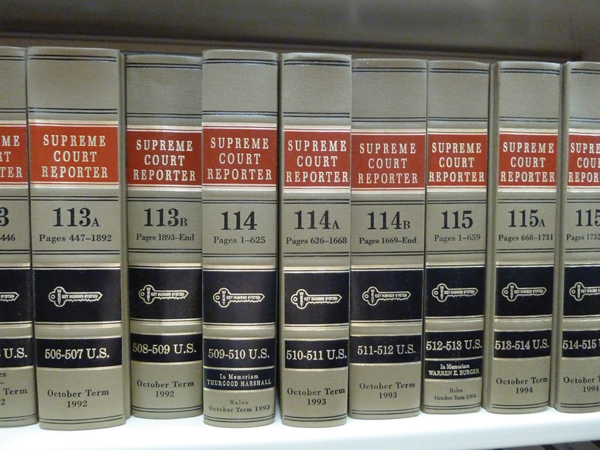
AS A MUSICIAN, YOU WILL BUY AND SELL HUNDREDS OF ITEMS over the course of your career. From instruments to gear, tour vans to used albums, nearly everything you own – minus a handful of cherished items – is either on its way into or out of your life. But what if you could no longer legally resell copyrighted items without the permission of the copyright holder? This issue made it all the way to the Supreme Court this fall – to much online fanfare. Here is what you should know (and whether the Supreme Court’s decision could affect you).
Background: Supap Kirtsaeng, a Thailand native, re-sold copyrighted textbooks published abroad on eBay. Because the international editions of the textbooks were nearly identical to U.S. versions (and at a fraction of the price) Kirtsaeng was able to turn a handsome profit, netting approximately $900,000. The case, Kirtsaeng v. John Wiley & Sons, Inc., now at the United States Supreme Court, originated when publisher John Wiley & Sons brought suit against Kirtsaeng for copyright infringement, and won after a New York jury awarded Wiley the amount of $600,000. Now on appeal, the Supreme Court must parse between several areas of copyright law relating to copyright and the first sale doctrine.
Legal Issues: As a basic rule, copyright protection lasts for the life of the author plus an additional 70 years and includes the right to exclusively reproduce and sell the copyrighted work. In addition, the Copyright Act prohibits the importation of a work without the authority of the copyright’s owner. However, while a copyright holder retains the right to initially sell his/her work, the “First Sale Doctrine” under the copyright code allows those who have purchased a copy lawfully to sell that copy to someone else. The First Sale Doctrine is important: without it there would be no free market for used records and – more importantly – the copyright owner’s right of distribution could overreach, extending past the first sale, all the way down the stream of commerce.
The legal issues before the Supreme Court were summarized rather succinctly by the Huffington Post in a recent column, stating:
“The issue at the Supreme Court concerns what protection the holder of a copyright has after a product made outside the United States is sold for the first time…Whether U.S. copyright protection applies to items that are made abroad, purchased abroad and then resold in the U.S. without the permission of the manufacturer. The [Supreme Court] split 4-4 when it tried to answer that question in a case in 2010 involving Costco and Swiss watch maker Omega…The court already has rejected copyright claims over U.S.-made items that were sold abroad and then brought back to the United States for resale.”
Essentially, this is a very narrow issue focusing on goods created overseas and sold in the U.S. for the first time. However, several other issues may likewise be relevant and the circuit courts are split with different findings. The Second Circuit held that a foreign-made product may not ever be resold within the United States without the copyright owner’s permission, while the Ninth Circuit held that a foreign-made product may sometimes be resold within the United States without permission, but only after the owner approves an earlier sale in this country. Finally, the Third Circuit has stated that a product can always be resold without permission within the United States, so long as the copyright owner authorized the first sale abroad. Now you can understand why the Supreme Court has been asked to step in.
Kirtsaeng argues that his resale of the copyrighted books is not infringement and is protected by the “first-sale doctrine,” asserting that after a company sells a copyrighted product, the buyer may lawfully resell it. A brief written by NetChoice in support of Kirtsaeng’s positions states:
“There are several legal precedents which disfavor reducing rights under the first sale doctrine. The first sale doctrine has long been recognized as a defense to copyright infringement, striking a balance between the property rights of consumers and the promotion of progress in the sciences and useful arts by ensuring that copyright owners are compensated for the initial sale of the copyrighted good. As this Court held over a century ago, ‘one who has sold a copyrighted article, without restriction, has parted with all right to control the sale of it. The purchaser of a book, once sold by authority of the owner of the copyright, may sell it again, although he could not publish a new edition of it.’ Bobbs-Merrill Co. v. Straus, 210 U.S. 339, 350 (1908).”
Could this affect you? If you purchase products online which were created overseas and hold U.S. copyrights, this case could absolutely affect you. In oral arguments held this past October, Supreme Court Justice Stephen Breyer made an example of a used Toyota car manufactured overseas, which can include copyrighted sound systems and GPS devices. This could be an issue for someone who sells the used vehicle: do they violate copyright law during the course of their sale? So while a decision in favor of Wiley & Sons could drastically reduce rights under the first sale doctrine for copyrighted items bought and sold abroad, it will not affect your everyday ability to buy and sell within the United States.
The Supreme Court will issue its ruling and a decision on the matter during the first half of 2013.
For full legal coverage on the case, visit the SCOTUS Blog at:
www.scotusblog.com/case-files/cases/kirtsaeng-v-john-wiley-sons-inc
To check out the full NetChoice amicus brief, visit:
www.netchoice.org/wp-content/uploads/KirtsaengvWiley_SCOTUS_Amici.pdf
Adam Barnosky is a Boston-based attorney and writer. For music industry news, entertainment law updates, or to suggest an upcoming Legal Pad topic, find him on Twitter @adambarnosky.
Disclaimer: The information contained in this column is general legal information only. Consult your attorney for all specific considerations.
